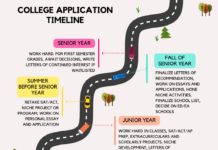High school extracurricular activities are very important parts of your high school experience. While your course rigor, grades, and standardized test scores are the most important factors in college admissions and determine whether or not you will even be considered at a given college or university, it is your high school extracurricular profile that will then set you apart from the masses at the colleges where you are a competitive applicant.
It may seem a bit odd to think about your high school extracurricular activities in terms of a curriculum, but, at MedEdits, we think this is an ideal way to get students on track, and to stay on track, when choosing the experiences that college admissions committees value most. Therefore, it is important to choose your extracurriculars carefully and make sure they are an extension of your interests and intellectual curiosities.
There are many different types of high school extracurricular activities to choose from and you should pick the ones that interest you the most. Choosing the right extracurriculars is essential, but it’s also important to be active in them. Don’t just join any club or activity; be involved and try to make a difference. Show that you care about your extracurriculars and that you’re passionate about them. College admissions officers are looking for leaders who will make positive impacts on campus and contribute to the intellectual vitality of the student body. Patterns repeat themselves which means someone who was a valuable community member in high school will be one in college and their future career.
So if you’re looking to set yourself apart from other college applicants, focus on your extracurricular activities. Choose selectively and then be an active and creative contributor. It will pay off in the long run.
Side note: These guidelines do not apply to “hooked” applicants.
Well-Rounded or “Spiked” High School Extracurricular Activities?
Extracurricular activities (ECs) are a vital part of the high school experience. They offer students the opportunity to explore their interests and passions outside of the classroom. ECs can also help students develop important skills, such as teamwork, leadership, and communication. So is is best to be “well-rounded” and involved in many unrelated activities or to have a niche or a spike (or two)? Recent research suggests that colleges are no longer interested in well-rounded applicants.
Selective colleges now seek applicants who have demonstrated a deep level of accomplishment in one or two areas. These areas can be in any discipline but must show deep interest for that discipline. So, if you’re interested in attending a top college, and not everyone is, it’s important to focus your energy on developing skills and interests in one or two areas. Don’t worry though – you don’t have to sacrifice your other interests! You should still participate in other ECs and hobbies that you do mostly for fun, but make sure that you dedicate most of your time and energy to developing skills and interests in your chosen areas.
No matter what activities you choose, make sure you devote your time to something you will enjoy and are passionate about. Being heavily involved in something you don’t enjoy or find interest in will drain your energy and motivation and counterproductive. College admissions officers want to see that you have taken the time to find out where you can make the greatest contributions and that you are doing your best to pursue those interests.
High School Extracurricular Activity Niche
When looking to apply to college, it is important to define your niche early on. This means finding an activity or set of high school extracurricular activities that you are passionate about and that sets you apart from the thousands of other applicants. Admissions officers are looking for interesting applicants who have already demonstrated a true interest and talent or have made a valuable contribution in a specific area. Why is this?
Colleges are seeking individuals who will make meaningful contributions on campus in every major they offer. Let’s look at two student profiles to illustrate this point. Let’s say a student is applying to college as an art history major, which student, Michael or Sarah, do you think would be more appealing to admissions officers:
Meet Michael. Michael has taken studio art classes since he was young and has continued to take art classes, including AP Studio Art and AP Art History in high school. He earned 5s on both AP exams. He also submitted several works to Scholastic earning two Silver Keys last year. He is captain of the soccer team and a two year varsity player, plays the violin in the school orchestra, is captain of the Debate team, and a member of the National Honor Society.
Meet Sarah. Sarah has also taken art classes since she was young and took AP studio art and AP Art History. She also has two Scholastic Silver Key awards. She created a not for profit bringing art classes to a under resourced community center near where she lives, interned at a major art museum last summer, and wrote a research paper about Frida Kahlo that she is getting published in a national art journal.
Michael and Sarah both have the same grades, but Michael’s has taken five more AP classes than Sarah. They have comparable SAT scores and strong letters of recommendation. They are both unhooked applicants.
So, if you were an admissions officer, which applicant would be a stronger candidate for an Art History major? Clearly Sarah has accomplished more in this discipline and is likely to be favored over Michael as she is the stronger applicant for Art History, specifically.
How to Find your High School Extracurricular Niche
When you’re a high school student, it’s important to define your niche. To those of us who applied to college long ago when “well-roundedness” was the in-idea, this may sounds ridiculous. But, now high school seniors are expected to be “niched” if they want to have a chance of getting accepted to top schools.
So, how do you go about finding your niche and selecting high school extracurricular activities? It may take some time and effort, but it will be worth
it in the end. The best way to find out is to try new things and explore different interests. The more involved you are in activities that interest you, the easier it will be to find your niche.
Ask yourself these questions:
- What makes me unique?
- What am I interested in?
- What can I talk about for hours on end?
- What topics do I enjoy discussing and reading about most?
- What activities am I most passionate about?
- What kind of people do I want to surround myself with?
- What am I good at?
- What do I enjoy doing?
- What activities am I particularly passionate about?
- What do I want to achieve in life?
- What is distinctive about my background and upbringing?
When you know who you are and what makes you special, you can start to share that with the world. Once you have some answers, start sharing them with your friends, family, and teachers. They can help you figure out what your niche is and how to best share it with the world. And remember, it’s always okay to change your mind! You might think you know what your niche is, but then something new might catch your interest and change things up. That’s part of the fun of finding your niche – it’s always evolving!
It might take a little bit of time and soul-searching and discovering what motivates you most is not a speedy process. However, going through this process will result in better outcomes; when colleges are looking at applications, they love to see students who know themselves and aren’t afraid to share that with others.”
A Word of Caution
It’s also important to be realistic about your abilities when choosing high school extracurricular activities. Don’t try to reinvent yourself as an expert in something if you don’t have any experience, interest, or knowledge in that area. There’s no need to put unnecessary stress on yourself during the college application process. Just focus on identifying what makes you unique and highlighting those qualities in your applications.
And, not every student wants to excel in the same way; this is something parents must be keenly aware of as well. Not every high school student is aiming to get into a top college and that is perfectly okay! Parents also cannot dictate how their children spend their time and what they accomplish.
In other words, the student must be the one who is really interested in doing the work to excel and must have a genuine desire to do so. We know that sometimes being a helicopter parent is what we think is best to help our child succeed, but, more often than not this plan backfires leading to dysfunctional parent/child relationships, children who don’t develop a work ethic or learn to advocate for themselves, and added stress for the child.
We work with many successful students at the graduate school level who did not go to “top-ranked schools.” Be kind to yourself and your child and honest about how much work the child is interested in doing and what their goals are.
How to Choose Your High School Extracurricular Activities
At MedEdits, we like to think of extracurriculars across certain domains that demonstrate certain characteristics. We also recommend students think about what Cal Newport calls “The Failed-Simulation-Effect Hypothesis (FSEH)” when choosing activities. The hypothesis states: If you cannot mentally simulate the steps taken by a student to reach an accomplishment, you will experience a feeling of profound impressiveness. This means when an admissions officer reads about your accomplishment they think: “How did they do that? I could never accomplish that. Wow. I am impressed!” Keep in mind that the vast majority of students will not achieve the FSEH but many come close!
Now, another interesting point Cal Newport writes about, is that students who have a focus, or a niche, as we call it, achieve the following:
1) They tend to spend less time on extracurriculars.
2) They experience less stress.
3) They don’t have to struggle to “keep up” or “collect” experiences to fill their resumes.
Ideally you want one or two activities that come close to reaching the FSEH. By carefully selecting your high school experiences and trying to hone in on your interests, you can ideally increase efficiency, enjoy high school a little more, and stand out in the college admissions process.
Common Mistakes when Selecting High School Extracurriculars
There are certain high school extracurricular activities that come with a lot of stress and time commitment without necessarily providing any benefits for your college applications. Here are some mistakes students make when deciding what to pursue extracurricularly:
1) Choosing an activity you aren’t really interested in but you think will “look good” to colleges. Choosing to engage in an activity in which you aren’t really interested will drain your energy and it is also unlikely it will really “fit” with your niche or other interests. If an activity is a chore, or if you only do it to check the box, this lack of authenticity is likely to come through in your application. It is much better to have fewer activities in which you are really engaged while demonstrating leadership and making an impact.
2) Getting involved in too many activities. When you spread yourself too thin, this will dilute the impact you can have in any one activity. It is also difficult to be really good at anything when you are trying to do everything. When you try to do everything, usually nothing really stands out.
3) Doing things just because your friends are doing them. It’s great to have friends who share your interests, but don’t let peer pressure or a need to “be with your friends” be the sole reason you engage in an activity.
4) Following the crowd. It is much more difficult to stand out in very popular activities such as debate or mock trial where the competition to excel will be much greater. That said, if you have been debating, for example, since middle school and you are really outstanding, you will likely excel in high school as well so this could be a good thing to pursue.
5) Saying yes to everything and be a “member” of multiple clubs at your school. If you are just a member of multiple clubs, your high school extracurricular experiences are unlikely to be memorable. What you want to focus on is being an active member and making a difference. Aim to be a club leader, start a new club or initiative, or take on a project.
6) Doing things just because they are easy. Extracurriculars are a chance for you to step out of your comfort zone, try new things, and grow as a person. It is rare that an easy activities leads to meaningful contributions or outcomes.
7) Not focusing on your strengths. Just like activities you aren’t really interested in, if an activity doesn’t play to your strengths, it will be a drain on your energy. It is much better to focus on things you are good at and enjoy.
8) Doing things just to get awards or recognition. This often backfires as people can see right through it. Any awards or recognition should relate to your well-established interests.
9) Doing things that don’t reflect well on you. This should be obvious, but high school is not the time to take risks that could reflect poorly on your character.
10) Getting involved in very time consuming activities. The activities that come to mind here are sports. Athletics are very time consuming and the majority of high school athletes will not end up being hooked recruited athletes. I am not saying you should drop a team sport you enjoy, but be mindful of the fact that late practices and games and weekend commitments can take away significantly from valuable time you could be spending elsewhere.
Cal Newport, also writes about the “superstar effect.” Superstars are “genuinely interesting people who have done genuinely interesting things.” These superstars are memorable and have defined their own niche organically in ways that aren’t forced or contrived. “The Superstar Effect bonus is true regardless of the competitiveness of the activity for which you are the best. Therefore, pursuits that do not have lots of competition yield a higher ratio of impressiveness to hour of work. Put another way, becoming a meteor expert is much easier than becoming one of the nation’s best young violinists.”
So, what does this mean? Explore that niche interest, don’t follow the crowd, think creatively, and don’t force your interests.
By making the mistakes listed above, a student is not likely to engage in what MedEdits terms “The Five Is” through “ABCs” which, if followed, will ensure you engage in the most significant experiences for you!
About MedEdits
MedEdits helps students get into college by helping them to develop a niche by choosing high school extracurricular activities selectively to stand out in the process. Our consultants have years of experience working in college admissions and serving on medical school admissions committees. Many have served as faculty members at the top schools in the United States.
Are you Looking for Help Getting into College or BS/MD Programs?
Schedule a Free 15 Minute Consultation with a MedEdits expert.
MedEdits: The Five Is and ABCs of High School Extracurriculars
At MedEdits, we encourage students to think about what we call the Five Is and your ABCs when choosing high school extracurricular activities. Keep in mind that you want one or two activities to which you devote most of your time. Therefore, not everything you do should satisfy the Five Is and the ABCs.
Engage in activities that demonstrate The Five Is:
1) Initiative. Colleges love students who show initiative as these students will be future leaders and change-makers on campus and beyond.
2) Impact. In whatever you do, have purpose and make some valuable impact whether that is raising a large amount of funds, increasing membership of involvement of others, impacting others in a positive way, or making change within your community. Think about how to quantify your accomplishments.
3) Intellectual Curiosity. Colleges are fundamentally looking for students who will excel academically which is why demonstrating your intellectual curiosity though your activities is crucial.
4) Individuality. College officers are going to be more impressed by experiences and accomplishments they haven’t seen thousands of times. Explore your distinctive curiosities in creative ways. Be wary of getting involved in very commonplace activities (think sports, debate, mock trial, theatre) unless you can really excel in them.
5) Ingenuity. Your experiences and accomplishments are more likely to set you apart if they are unusual and interesting. Get creative. Think about how to merge two or three of your interests into a single activity.
Accomplish The Five Is through your ABCs:
A: Advocacy. Advocacy and using your skills to help others in any form is a very important skill to develop and something colleges love to see.
B: Branded or Bizarre Experiences. These are accomplishments that uniquely your own and would be tough to replicate.
C: Community Service. Improving your own community and the world around you is vitally important to admissions officers.
D: Discovery. Anything that demonstrates your interest and ability to explore curiosities deeply count as “discovery.” Any type of research would fall into this category.
E: Exceptional Accomplishment. If you are a dancer, an athlete, an actor, a musician, or a debater, for example, you ideally want to be the best at what you do and to receive regional, national, or international recognition. This does not mean you shouldn’t have hobbies, however, in such areas.
High School Extracurricular Timeline
Freshman Year:
This is the year to try new things! Get involved in as many different clubs and activities as you can that interest you. The key word here is “interest.” Don’t just join something because your friends are. You want to focus on those experience that instinctively appeal to you. By making choices this way, you are more likely to find a genuine curiosity or curiosities that you can then build on. Keep in mind that everything you get involved in may not “stick.” Not to worry! You may have to try out many different activities and get involved in several things to find the ones that really resonate with you and through which you can demonstrate the Five Is.
Sophomore Year:
By sophomore year, you should have a better idea of what your passions and interests are. This is the time to start to focus on two to four activities that you can really devote yourself to and through which you think you can make an impact. These activities should also play to your strengths. You want to be able to demonstrate excellence in whatever you do. Remember the Five Is and your ABCs as you continue to engage in high school extracurriculars inside and outside of school.
Junior Year:
Your junior year is when you really want to buckle down and focus on those high school extracurriculars that matter most to you. This is also the time when colleges will start paying attention to what you have been doing over the past couple of years. They will be looking for evidence of the Five Is as well as your ABCs. Make sure you are doing things in which you can really shine and show colleges what makes you unique and special.
This is also the time to start thinking about research or independent project opportunities. If you can get involved in a research project, or even just shadow or intern with a researcher in your area(s) of interest, it will provide evidence for your commitment.
By the end of junior year you want to have a defined niche that you can continue to develop over the summer and into the fall of senior year. You also want to start thinking about what major you will apply to and how your extracurricular experiences will provide evidence for your interest in that major. What you do the summer of your junior year often serves as the final “push” for college admissions. Try to tie your experiences together or dive deep into whatever interests you most to offer the most evidence for your interest in that area or discipline.
Senior Year:
This is the year to put all of your extracurricular activity experience to good use! Your college applications will be due soon, so make sure that you are highlighting your most impressive accomplishments.
This is also the time to really focus on your future plans. If you know what you want to do after college, use your extracurricular activities to help you achieve your goals.
Conclusion
No matter what year it is, always remember to have fun with your extracurricular activities! They should be something that you enjoy, not something that feels like a chore. And be sure to engage in some activities that are just for fun! When you genuinely enjoy what you are doing, it will show in your commitment and dedication, which are two things that colleges always look for. So go out there and get involved in activities that interest you. The sky’s the limit!








